|
In (decent) Memoriam
I can hardly believe that April 1st marks a year since the untimely death of that superstar of Scandinavian crime fiction Nisse Ektorp at the age of 25, but sadly I am not at all surprised at the many callous attempts to cash in on her memory.

One would have thought that her Fruits of the Doom trilogy comprising her three crime novels – The Blood Apple, The Stone Grapes and the 1,000-page The Figs of Death which is about to appear in paperback – was a fitting enough memorial for her, not to mention the boom in sales which her designer-line of thermal lingerie has enjoyed in the recent cold snap. Or indeed the 149-hour television version of Blood Apples and Other Fruit currently running on BBC4 from 6.a.m. to 7 p.m. every Saturday, or the several film versions currently in production; not to mention the proposed West End musical version with book and lyrics by Ben Elton.
More worrying, however, coming as they do in advance of the much-anticipated ‘official’ biography The Girl Who Came Too Soon by Scandi-crime expert Professor Barry Forshaw (to be published by Renat & Spendrups), are numerous ‘kiss and tell’ memoirs by persons claiming familiarity with the shooting-star career of Nisse Ektorp. Among the hastily-penned ‘memoirs’ already available are Are You Coming Quietly, Miss Ektorp? By Cariel Svedka, and Hands Up Miss Ektorp by Närke Starkporter, but for my money, the true student of crime fiction and admirer of the much-missed Nisse Ektorp should hang on to their disposable income and wait for Professor Forshaw’s definitive study, despite its publication being cruelly delayed by the exhausting lecture tour the Professor is currently embarked on.
The (Private) Eyes Had It
In the latest edition of CADS magazine – a fine journal with an international and erudite readership – I was given the opportunity to sing the praises of an author I first came across as a schoolboy although I have never, in the (many) intervening years, met anyone else who had even heard of him.
 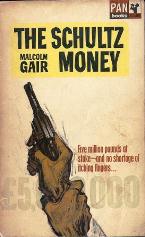
The Schultz Money, first published in 1960, was the fifth(out of six) thriller by ‘Malcolm Gair’ – a pen-name used by John Dick Scott, a former literary editor of The Spectator and novelist under his own name. It stayed in my memory for all those years not only because it was a fast-paced and exciting but because it featured a private eye who was British and in those days, that was quite something.
Now I would not claim that Gair’s hero Mark Raeburn was as iconic a hero as a Marlowe, a Spade, an Archer, a Spenser, a Warshawski or a Milo Milogradovitch (or C.W. Sugrue), but, dammit all, he was a British P.I. at a time when there were precious few about. In fact until recently, I thought there was only one other contemporary one – Rex Carver, created by Victor Canning in 1965 – until, that is, I came across Harry Kent, a London-based private detective created by Christopher Landon in The Shadow of Time in 1957. I believe that book to be Harry Kent’s only outing in a novel, and he’s a decent enough hero trying to trace a missing child in a mystery which switches from the historic south coast town of Rye (and at one point, rather confusingly into Kent) to the Loire valley in France.
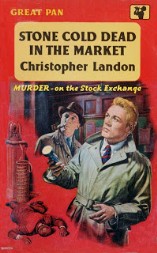 

It was by no means Landon’s first foray into crime fiction, his 1955 detective story Stone Cold Dead in the Market about a murder on the Stock Exchange was highly thought of, but his most famous novel, of course, was his tense war story Ice-Cold in Alex (also 1957), superbly filmed as probably the best advert for Carlsberg lager ever.
Christopher Guy Landon (1911-1961) read medicine at Cambridge but preferred a career as a journalist and then a stockbroker until World War II when he served with a Field Ambulance brigade throughout the North African campaign; hence the authentic background for Ice-Cold. After the war he ran a country pub (and details of the pub trade are a plot-point in Stone Cold Dead) and concentrated on fiction, turning out short stories and a handful of novels before his untimely death at the age of 50.
So that’s three British private eyes from the late Fifties / early Sixties period now, Landon’s Harry Kent, Mark Raeburn and Rex Carver, but I am sure I will hear of more if only from the very knowledgeable readers of CADS (crime and Detection Stories) magazine, details of which can be obtained from its editor and publisher Geoff Bradley on Geoffcads@aol.com
And Still Do
The private eye still thrives in crime fiction, in every possible location and period. There are probably some Scandinavian ones somewhere, if only I had the energy to find out.
Rome has a couple of good ones, albeit of different sexes and separated by 2000 years. Still, those villis vicus won’t pound themselves, as one of the new kids on the insula proves perfectly in what I am sure is the start of a successful series.
Flavia Alba, the adopted daughter of Marcus Didius Falco, is, technically, an ‘informer’ which was a hairy enough profession in Imperial Rome in 89 AD where life was cheap and ‘informer’ was probably not seen as a suitable job for a women, but then fitting in and conforming was never one of her adopted father’s strong points either.
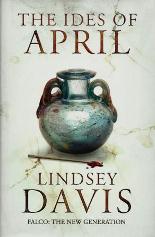
The Ides of April, published by Hodder, is, of course, by Lindsey Davies whose Falco books over the last 20-odd years have won her almost as much international acclaim as one of the Five Good Emperors. She has received not only the Cartier Diamond Dagger for lifetime achievement but in 2010 the city of Rome gave her the Premio Colosseo award for enhancing the image of the city.
I am not sure that Tobias Jones will be nominated for a prize for enhancing the image of Rome as his private eye, Castagnetti, stomps the mean streets of the modern city unearthing political corruption, media manipulation and the bunga-bunga party sub-culture.
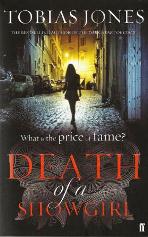
In Death of a Showgirl, out now from Faber, Jones gives us a Rome stripped bare of history, culture and, often, humanity. Anyone hoping for jolly wine-sipping philosophising policemen or even the odd Tuscan recipe will be disappointed. This is a private eye story in the Ross Macdonald mould (a pretty good mould to come from) and not a tourist guide.
And although he’s a lawyer rather than a private eye, Gibraltar-based Spike Sanguinetti certainly acts like one. The only problem with being based on the Rock of Gibraltar is that it’s rather small so the number of cases he can get involved in must be limited and his first outing last year took place mostly in Morocco just across the water.

In his second case, Sign of the Cross, from Bloomsbury, Thomas Mogford sends Sanguinetti to Malta, another British outpost of an island halfway across the Mediterranean, to investigate the very suspicious deaths of his aunt and art historian uncle, their deaths forming a very brutal prologue to the book. Some of the bitchy dialogue comparing the two islands is absolutely priceless and Mogford shows a sharp eye for descriptive detail.
I was impressed with Mogford’s debut, Shadow of the Rock last year and I think Sign of the Cross is even better, enhancing Spike Sanguinetti’s reputation as a resourceful and likeable hero, despite being a lawyer. If his adventures continue their island-hopping progress (where next – Cyprus?) hanging on to Spike’s coat-tails will be almost as much fun as a Mediterranean cruise without the downside of seasickness or that awful couple from Birmingham who always insist on joining one at the Captain’s table.

For those die-hard fans who believe that the private eye novel is, and should be, essentially American, then June will be a good month as it sees the return of one of the most innovative characters in the genre, Easy Rawlins in Walter Mosley’s Little Green from Weidenfeld. It is over twenty years since Easy Rawlins knocked the socks off critics here with Devil in a Blue Dress and I remember meeting Walter at a very posh Crime Writers’ Association dinner where he and I were both to receive awards. Walter, a genuinely shy and modest man I believe, seemed slightly bemused by the whole thing. But then, so did I.
Magic Memoirs
The smallest section in the Ripster Hall library is that snug little corner given over to Autobiography and Memoirs. I am not a fan of this particular literary form as I find most personal memoirs self-serving and full of exaggeration and name-dropping; and that’s far too much like writing this column.
I do make some notable exceptions, however. The trilogy known as From Middle England by that late, great critic of crime fiction Philip Oakes, rightly takes its place as a poignant and poetic autobiography, which is used, I believe in the teaching English in the Far East. And of course no library should be without copies of the much-missed Gore Vidal’s cheeky memoirs Palimpsest and Point-to-Point Navigation. Now I have new volume to add, once I have stopped laughing that is.

Christopher Fowler’s Film Freak to be published shortly by Doubleday is the confessions of a film nut determined to get into the British film industry at precisely the wrong time, just as the flea-pits were closing down and videos taking over. Though quite when there was a good moment to get into British films, unless you were Sid James or Alec Guinness, is a moot point.
Fowler, better known in this column as the author of the slightly surreal ‘Bryant & May’ detective series, was a self-confessed Film Freak from an early age and determined to get into the film world by any route possible; initially through advertising agency copy-writing and then producing trailers and posters for general release movies. His assault on Wardour Street (rather than Hollywood) coincided with British classics such as Ooh…You Are Awful and Mutiny on the Buses (rumoured to be the biggest earning Hammer film ever) signalling the death-knell, or at least the terminal decline, of the British film industry.
Whether he is being gruesomely honest about seedy pubs and even seedier bed-sits, taking side-swipes at slappable performers like Charlie Drake, Norman Wisdom and Cliff Richards, or defending Kenneth Williams and films such as Dr Phibes Rises Again, he is never less than affectionately amusing. When he is describing the bad behaviour rampant in the advertising industry in the 1970s or disastrous trips to the Cannes Film Festival, he is hysterical. This is a laugh-out-loud memoir of a slice of British life which has probably gone forever and for all its misfortunes and indignities, Fowler shows a great fondness. Although I think he was far too young to experience it on release, Chris Fowler knows the importance of the impact on the British psyche of Kay Kendall’s trumpet solo in Genevieve. That alone proves he really is a film freak.
A Theme Park of a Thriller
On a recent visit to one of the dustier rooms of the wing of Ripster Hall Library I rediscovered and re-read with pleasure an exciting, fast-paced thriller from 1970 titled Overkill by an American writer, John Lange.
The plot, which has undertones of science fiction involves a secret island holiday resort not far off the coast of South America (Okay, Jurassic Park but without the dinosaurs) where guests can indulge their wildest fantasies and have the absolutely perfect vacation (Okay, Westworld but without homicidal robotic gunfighter Yul Brynner).
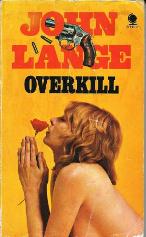
If you haven’t guessed yet that ‘John Lange’ was a pseudonym for Michael Crichton, then shame on you. Under the Lange name he wrote eight thrillers up to and including the excellent Binary in 1972, by which time his real identity had been revealed, and the few I have read have all been pretty good.
The pharmaceutical industry conspiracy at the heart of Overkill is based on the development of wonder drugs which can make life seem like heaven, or hell, and how a young Californian doctor is persuaded to work for these corporate villains. Its American title was Drug of Choice, which is far better than that adopted by his British publishers.
|
|
Springs Past and Present
In the course of the annual Spring Clean of my office desk (made from the timbers of a Confederate blockade-running sloop which surrendered in Liverpool in late 1865), I came across a file of yellowing newspaper cuttings dating from March 1993 when I had the dubious honour of being crime fiction critic for that once-great newspaper the Daily Telegraph.
In my column that month twenty years ago, I reviewed the latest crime novels by Americans James Hall and Robert Campbell and Brits Mark Timlin, David Armstrong and, spookily, Lesley Grant-Adamson. I say ‘spookily’ not because of Lesley’s book or my review: the novel was The Dangerous Edge and I found it a “cultured and often elegant Euro-thriller spanning thirty years and involving kidnap, art history and ex-spies in post-Communist Prague”.
The spookiness comes in the fact that exactly twenty years later, I find myself in the position not of Lesley Grant-Adamson’s reviewer, but her editor, and am proud and delighted (not to mention contractually obliged) to announce that three of her early crime novels – Patterns in the Dust, Guilty Knowledge and Wild Justice – first published 1985-87, are now available in the Ostara Crime series as Print-on-Demand trade paperbacks and as eBooks.

Lesley, who has the good taste to live in East Anglia, is the fourth author to appear in Ostara Crime colours since the imprint was launched less than a year ago. Along with Christine Green, Denise Danks and Janet Neel, Lesley joins a ‘Fantastic Four’ of all-female British crime writers whose books are being brought to a new generation of readers. I can. However, reveal that the fifth author to be reissued by Ostara Crime (in the Autumn) will – radically – be male!
Errata
In last month’s column I made the unforgiveable error of suggesting that The Beautiful Mystery by Canadian mystery maven Louise Penny was yet to be published in the UK.

What I should have said was that for legal reasons I was not aware that it had been published in hardback by Little, Brown in August last year and in fact comes out in paperback in July.
When Crime Writers Meet
I always look forward to meeting up with spy-writer David Brierley on his annual visit to his London boot-maker from his secluded chateau (famed for its cheeses) in the south of France.

Over lunch in his exclusive West End club, we discussed the state of the spy-fiction industry (I declare an interest here as I am David’s editor for the Top Notch Thriller editions of his excellent Cold War and Big Bear, Little Bear), eBooks, agents, publishers and, of course, other crime writers; in particular, meeting rather famous crime writers for the first time.
To my astonishment – for he must have been a very young man – David informed me that (as a very young man) he had met Raymond Chandler on his last visit to England shortly before his death and proceeded to tell scurrilous stories of how the great man misbehaved himself under the influence of a long and rather alcoholic breakfast.
Whilst those stories are hardly suitable for a family blog such as this, it did set me thinking that there was possibly a series in this, chronicling the first meetings of crime writers. I know that Len Deighton has written of his first meeting with Ian Fleming and Barry Norman (a thriller writer before he turned film critic) has written of his first meeting with Len Deighton, as well as Alistair Maclean and Georges Simeon. I am sure I have read somewhere Harry Keating’s impressions on meeting Agatha Christie and I myself have dined out on the story of my first meeting with Gavin Lyall, one of my thriller-writer heroes.
I rapidly convinced myself that there was material here for a long-running regular series, perhaps called First Impressions, run as an adjunct to this column, but I quickly nipped the idea in the bud. What if someone suggested doing their ‘First Impression’ of meeting me?
Revivals of the Month
When I recently suggested the introduction of a “Richard III Award” for crime writers who have been unjustly forgotten for up to 528 years, I did not expect to find myself nominated as the first candidate by the Irish godfather of noir (or should that be grandfather?), Ken Bruen. Thanks, Ken, when’s your next book out for review?
However, two characters far from forgotten, but well worth reviving, are Matt Helm and Modesty Blaise and Titan books have done just that this month.
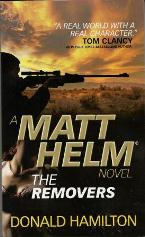
Titan has plans to reissue six Matt Helm thrillers by Donald Hamilton this year, and more next. The latest being The Removers which is set a year after Helm is ‘re-activated’ after wartime service as an American agent/assassin (in Death of a Citizen, already out from Titan).
Modesty Blaise – sometimes known as “James Bond in Heels” – is an iconic character from the Swinging Sixties. I know this because Professor Barry Forshaw has been telling me so for years, long before he was distracted into becoming the world’s leading expert on ‘Nordic Noir’. Originally a comic strip cartoon in London’s Evening Standard, launched in 1963, her creator Peter O’Donnell, who died in 2010, featured Modesty in a dozen or so novels and collections of stories up to 1996.
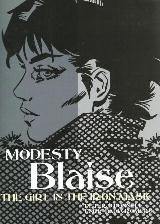
Purists naturally insist on the original comic strip version and Titan have provided just that in Modesty Blaise: The Girl in the Iron Mask, although their new volume features three complete Modesty Blaise ‘strips’ (the other two being Fiona and Walkabout) which have never been collected together before.
Penguin Parties
Parties thrown by those perky publishers Penguin (which used to be annual events) are usually guaranteed to be good fun, so it was with great regret that a compendium of medical misfortunes caused me to miss this year’s.

Other party animals, however, did not and Professor Barry Forshaw and Shots editor Mike Stotter were caught ‘chillaxing’ as I believe the young people call it with Penguin authors Meg Gardiner and Felix Francis.

I was particularly keen to ask about their new policy (if I have understood it correctly, which is unlikely) of publishing new crime fiction authors in eBook format up to nine months before allowing a printed version. A case in point are the two James Oswald novels Natural Causes and The Book of Souls which have, it says here, ‘sold in excess of 350,000 eBooks in 2012’ but which do not appear as printed books until May and July.
An interesting experiment in marketing or a warning of things to come for those of us determined to remain Kindle-free? Perhaps millionaire playboy Prince Ali Karim (looking rather weary after a week in a submarine, removing several of his deposit accounts from Cyprus) knows the answer as he seems to have had a firm grip on best-selling James Oswald.

Caught in the Act
It is a little known fact that in certain London hostelries, secretive closed-circuit television cameras track and zoom in on suspicious characters who take up valuable bar space before buying a drink. I have to admit that I was caught in this highly unusual situation myself last month, but it is testimony to Paul Thomas’ excellent thriller Death on Demand (Bitter Lemon Press) that I simply had to finish a chapter before ordering a medicinal lemonade.
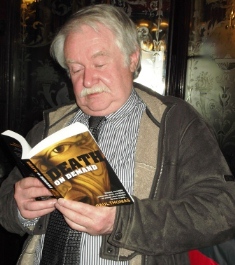
Featuring the return, after far too long an absence, of maverick Maori policeman Tito Ihaka recalled to a seemingly cold case in Auckland and getting involved in some hot ones along the way, this is an absolutely cracking crime novel and will, if there is any justice, be recognised as one of the best of the year for the simple reason that it has it all. A plot convoluted enough to satisfy the most dedicated puzzle fiend, some brilliantly drawn characters (not a duff one among them, from dodgy policemen to only slightly dodgier gangsters), great pace with short, sharp bursts of violence, dialogue which crackles and spits and a sense of place which reminds us, on the far side of the world, that New Zealand is a living, breathing modern country with problems and not just a set for Hobbit movies.
I cannot recommend Death on Demand too highly and do not be put off by the multi-stranded 36-page Prologue. It all becomes clear in the end.
Well, Hello Hamish
Marion (M.C.) Beaton may have sold over 10 million books worldwide and be the third most borrowed author from libraries, but she shows no sign of resting on her laurels.
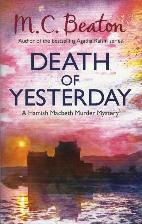
Her latest novel features probably her best-loved series character, Scottish policeman Hamish Macbeth (though Agatha Raisin has her supporters – millions of them) in Death of Yesterday, which I believe is the 28th in the series which began in 1985 and formed the basis for the BBC series Hamish Macbeth starring Robert Carlyle and running from 1995-97.
For legal reasons, I was unable to renew my acquaintance with Marion at a party thrown by her publishers last month, but two years ago at the Reading Crime Festival she made a fascinating case to me (in the Green Room, off-stage) as to why Robert Carlyle had been completely wrong for the role as his accent was from entirely the wrong part of Scotland for the character. I was ashamed to admit that it had not spoiled my enjoyment of the series, as a mere Sassenach, one jot but I am sure that Marion, formerly a distinguished journalist who has worked in Glasgow, knew of what she spoke.
TV Times
Am I alone in welcoming the new series of Scott & Bailey back to our television screens? I almost said “Am I alone among the chattering classes” but then remembered that I was expelled several years ago for refusing to watch The Killing without shouting at the screen.
Anyhow, Scott & Bailey are back for a third series, its first two Manchester-based series attracting more viewers than Downton Abbey and over seven times as many as The Killing, and it provides not only meaty roles for women as actors (the three leads are all superb) but also as writers and directors. I suspect the reason it has not garnered more awards (any awards?) from the crime fiction community is that it’s on ITV and not BBC4, but what do I know?
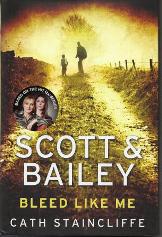
Well, I know that there’s a second Scott & Bailey novel out. Published by Bantam, Bleed Like Meis by Manchester-based Cath Staincliffe, in whose very capable hands these characters, who have been dubbed ‘a British Cagney and Lacey’, are perfectly safe.
Uncle Tom
After considerable success with the Mission Impossible franchise and, I presume, what will be a continuing franchise as Jack Reacher, there are rumours that Hollywood megastar Tom Cruise is to star in a re-boot (if that’s the word) of the occasionally bizarre and often highly camp Sixties television series The Man From U.N.C.L.E. for the big screen.
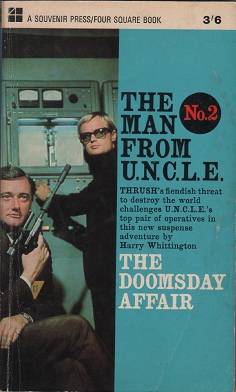
I have no idea if he is to take the role of Napoleon Solo (as played by the 1.78 metre tall Robert Vaughn) or the mop-haired Illya Kuryakin (played by 1.73 m. tall David MacCallum), or if U.N.C.L.E.’s sworn enemy is still the evil organisation known as THRUSH. Whilst everyone of a certain age remembers what U.N.C.L.E. stood for, what on Earth was THRUSH?
Pip! Pip!
The Ripster
|